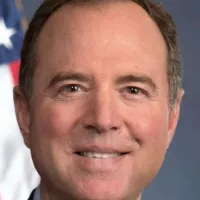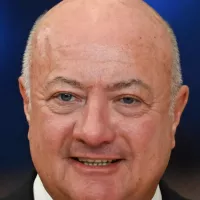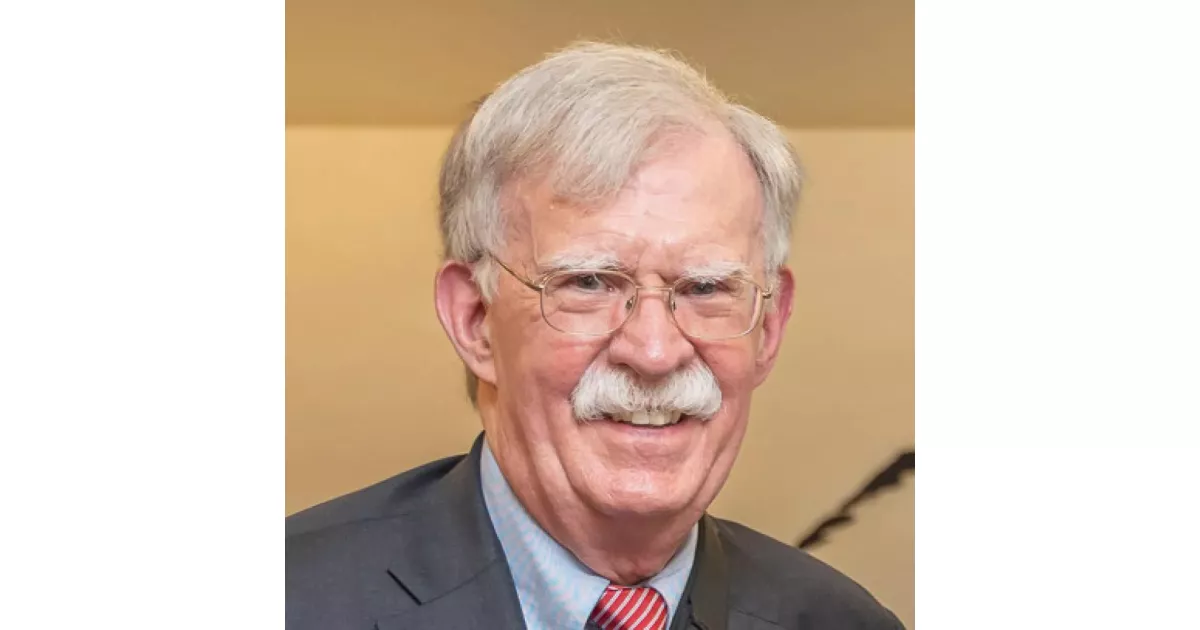A closer look at the most debated and controversial moments involving John Bolton.
John Bolton is an American attorney, diplomat, and Republican consultant known for his hawkish foreign policy views. He served as the U.S. Ambassador to the United Nations (2005-2006) and as National Security Advisor (2018-2019).
1970: Wrote about avoiding service in Vietnam
Before graduating from Yale College in 1970, John Bolton enlisted in the Maryland Army National Guard rather than waiting to find out if his draft number would be called and later wrote he had no desire to die in a Southeast Asian rice paddy and considered the war in Vietnam already lost.
1972: Biological Weapons Convention
The 1972 Biological Weapons Convention, was to be enforced.
1994: Criticism of the United Nations
In 1994, John Bolton stated, "There is no United Nations. There is an international community that occasionally can be led by the only real power left in the world, and that's the United States, when it suits our interests and when we can get others to go along."
May 2000: Bustani Re-elected for a four-year term
In May 2000, José Bustani had been unanimously re-elected for a four-year term—with strong U.S. support
2001: Colin Powell praised Bustani's leadership
In 2001, Colin Powell praised José Bustani's leadership.
2001: Derailed biological weapons conference
In 2001, John Bolton was instrumental in derailing a biological weapons conference in Geneva. The conference was convened to endorse a UN proposal to enforce the 1972 Biological Weapons Convention.
2002: Demand for resignation of José Bustani
In 2002, John Bolton demanded the resignation of Brazilian José Bustani, head of the Organisation for the Prohibition of Chemical Weapons (OPCW), allegedly threatening Bustani's family.
2003: Alleged role in Bush's State of the Union Address
Democratic Congressman Henry Waxman alleged that Bolton played a role in encouraging the inclusion of the statement that British Intelligence had determined Iraq attempted to procure yellowcake uranium from Niger in Bush's 2003 State of the Union Address.
April 2004: Again Accused Cuba
In April 2004, John Bolton again accused Cuba of being a terrorist and (biological weapons) threat to the United States.
June 2004: Congressional testimony on Iran
In June 2004 congressional testimony, John Bolton stated that Iran was lying about enriched uranium contamination.
April 12, 2005: Senate panel focuses on allegations that Bolton pressured intelligence analysts
On April 12, 2005, the Senate panel investigated allegations that John Bolton pressured intelligence analysts. Former State Department intelligence chief Carl W. Ford Jr. labeled Bolton a "serial abuser" of power and contradicted Bolton's earlier testimony, claiming Bolton asked him to fire an intelligence analyst.
May 26, 2005: Senate Democrats postpone vote on Bolton's UN nomination
On May 26, 2005, Senate Democrats postponed the vote on John Bolton's UN nomination, initiating the first filibuster of the year. Democrats alleged that the Bush administration withheld key documents regarding Bolton's career at the Department of State.
June 20, 2005: Senate vote on cloture regarding Bolton's nomination fails
On June 20, 2005, the Senate voted on cloture for John Bolton's UN nomination, but the vote failed. Senator Voinovich switched his previous "yes" vote and urged President Bush to pick another nominee. Later, Voinovich recanted his opposition.
July 28, 2005: Bolton's statement to the Senate deemed false
On July 28, 2005, it was revealed that John Bolton made a false statement on forms submitted to the Senate. Bolton had stated he hadn't been questioned in any investigation, but he had been interviewed by the State Department's Inspector General regarding pre-war claims of weapons of mass destruction in Iraq. The State Department later reversed its stance, claiming Bolton had simply forgotten about the investigation.
August 2005: IAEA report on Iranian uranium
At their August 2005 meeting the IAEA's Board of Governors concluded: "Based on the information currently available to the Agency, the results of that analysis tend, on balance, to support Iran's statement about the foreign origin of most of the observed HEU [highly enriched uranium] contamination."
2007: Comment about decision to avoid service in Vietnam
In 2007, John Bolton explained his comment in the reunion book saying his decision to avoid service in Vietnam was because "by the time I was about to graduate in 1970, it was clear to me that opponents of the Vietnam War had made it certain we could not prevail, and that I had no great interest in going there to have Teddy Kennedy give it back to the people I might die to take it away from."
2008: Campaign against EU integration
In 2008, Bolton campaigned in Ireland against further European Union integration, and he criticized the Treaty of Lisbon for expanding EU powers.
2010: Bolton wrote a foreword for The Post-American Presidency
In 2010, John Bolton wrote a foreword for the book "The Post-American Presidency: The Obama Administration's War on America" by Pamela Geller and Robert Spencer, endorsing the book and its critique of Barack Obama.
December 2012: Bolton suggests Clinton faked concussion
In December 2012, John Bolton suggested that Secretary of State Hillary Clinton had faked a concussion to avoid testifying before Congress regarding the attack on the U.S. Consulate in Benghazi, Libya. Bolton stated that this was a 'diplomatic illness' in December 2012.
July 2013: Identified as Member of Groundswell
In July 2013, John Bolton was identified as a key member of Groundswell, a secretive coalition of right-wing activists and journalists attempting to advance political change through lobbying.
2013: Chairman of Gatestone Institute
In 2013, John Bolton became the chairman of the Gatestone Institute, a far-right anti-Muslim organization known for disseminating false anti-immigrant and anti-Muslim information.
2014: Super PAC Payments to Cambridge Analytica
Since 2014, the John Bolton Super PAC had paid Cambridge Analytica more than $1.1 million for 'research' and 'survey research', according to the Center for Public Integrity's analysis of campaign finance filings.
December 2016: Bolton comments on Russian interference in the 2016 election
In December 2016, John Bolton stated that the United States Intelligence Community's conclusion that Russian hackers had intervened to help elect Donald Trump in 2016 may have been a "false flag" operation. In a subsequent interview on Fox News, Bolton criticized the Obama administration's retaliatory sanctions as insufficient and suggested that the US response should "make them [the Russians] feel pain".
March 2018: Suggested South Korea take North Korea
In March 2018, Bolton suggested that South Korea take North Korea and terminate the North Korean regime as the only "diplomatic option", and said that the war between the two countries is their problem and not the United States' problem.
May 8, 2018: Bolton dissolved the Global Health Security team
On May 8, 2018, John Bolton removed Timothy Ziemer and dissolved his Global Health Security team formerly on the NSC leaving the administration's high level preparation for and ability to respond to pandemics, infectious disease, and other biological threats unclear. The choice to remove and not replace Ziemer in the midst of an emerging Ebola outbreak in The Democratic Republic of Congo was criticized in several news outlets.
September 10, 2018: Bolton criticizes the International Criminal Court in first major address
On September 10, 2018, in his first major address as National Security Advisor, John Bolton criticized the International Criminal Court, saying it lacks checks and balances, exercises "jurisdiction over crimes that have disputed and ambiguous definitions," and has failed to "deter and punish atrocity crimes."
November 1, 2018: Bolton praises Bolsonaro and Duque
On November 1, 2018, John Bolton, as National Security Advisor, praised Brazil's president-elect Jair Bolsonaro and Colombia's president Iván Duque Márquez as "like-minded" partners and framed Bolsonaro's election victory as a "positive sign" for Latin America. He also criticized Cuba, Venezuela, and Nicaragua as a "troika of tyranny" in the speech on November 1, 2018.
August 2019: Bolton's Book Alleges Trump Froze Ukraine Aid
In August 2019, according to a forthcoming book reported by The New York Times, Bolton wrote that President Trump wanted to continue freezing Ukraine aid until investigations into Democrats, including the Bidens, were pursued.
September 10, 2019: Trump claims Bolton's services are no longer needed; Bolton contradicts claim
On September 10, 2019, President Trump claimed on Twitter that he had told John Bolton on September 9 his "services are no longer needed", thus Bolton gave his resignation on September 10. Just minutes later, Bolton contradicted Trump's account, tweeting out this claim: Bolton offered to resign on September 9, with Trump replying: "Let's talk about it tomorrow."
November 7, 2019: Refusal to Attend Impeachment Deposition
On November 7, 2019, John Bolton refused to attend his scheduled deposition in the impeachment inquiry against Donald Trump. He threatened legal action if subpoenaed, stating his willingness to testify pending a federal court ruling on the Trump administration and Congress's competing claims.
December 2019: Memoir Submitted for Security Review
In December 2019, John Bolton submitted his memoir, "The Room Where It Happened," for security review, a standard procedure given his security clearance.
2019: Sabotaged Trump's attempts to open diplomatic channels with Iran
In 2019, Bolton, Israeli Prime Minister Benjamin Netanyahu and Secretary of State Mike Pompeo successfully sabotaged Trump's attempts to open diplomatic channels with Iran.
January 6, 2020: Announcement of Willingness to Testify
On January 6, 2020, John Bolton announced in a written statement obtained by NBC News that he would testify during the Senate impeachment trial if subpoenaed. A 51-vote majority from the Senate would be required to obtain the subpoena.
January 28, 2020: Trump's Lawyer Dismisses Bolton's Claims
On January 28, 2020, Trump impeachment lawyer Jay Sekulow dismissed Bolton's claims from his leaked book as "inadmissible" during Senate defense arguments. This dismissal, according to Democratic trial manager Adam Schiff, validated the argument to call Bolton to testify.
June 16, 2020: Justice Department Attempted to Block Publication
On June 16, 2020, the Trump Justice Department attempted to block the publication of John Bolton's memoir, "The Room Where It Happened," seeking to confiscate his $2 million advance for breach of contract.
June 2021: Justice Department Dropped Criminal Inquiry
In June 2021, the Justice Department dropped its criminal inquiry of John Bolton and moved to end efforts to confiscate proceeds from his book.
October 2021: Plot to murder Bolton
In October 2021, Shahram Poursafi, an Iranian national, plotted to allegedly murder John Bolton, likely in retaliation for the January 2020 death of Qasem Soleimani.
July 2022: Admission of involvement in coups d'état
In July 2022, during an interview with CNN, John Bolton admitted to his personal involvement in planning unspecified coups d'état in foreign countries.
August 10, 2022: Iranian national charged in plot to murder Bolton
On August 10, 2022, Shahram Poursafi, an Iranian national, was charged by the United States Department of Justice in a plot to allegedly murder John Bolton in retaliation for the death of Qasem Soleimani.
December 2023: Proposed resettling Palestinians from Gaza
In December 2023, Bolton proposed resettling Palestinians from Gaza.
April 2024: Commented on the Gaza war
In April 2024, Bolton said that the Gaza war "is an Iranian war against Israel, fought through terrorist proxies", and the only way to end the suffering of the people of Gaza "is to eliminate Hamas, which is the cause of the suffering."
January 20, 2025: Protective detail rescinded
On January 20, 2025, President Trump rescinded the protective detail from the United States Secret Service that had been granted to Bolton after the murder plot against him was revealed.
July 2025: Suggested Algeria offer gift to Trump for Western Sahara recognition
In July 2025, Bolton suggested that Algeria offer Donald Trump a gift to abandon American recognition of Moroccan sovereignty over Western Sahara.
August 22, 2025: FBI Raids Bolton's Home
On August 22, 2025, FBI agents raided John Bolton's home as part of a documents investigation. The raid occurred at approximately 7 a.m., authorized by a court order, and involved a search for "classified materials" in both his home and his property in Washington, D.C.
Mentioned in this timeline

Donald John Trump is an American politician media personality and...

Adam Schiff is an American politician and lawyer currently serving...
Fox News Channel FNC is a conservative American news and...

Bill Clinton served as the nd U S President from...
Ukraine is a country in Eastern Europe the second-largest on...

Hillary Diane Rodham Clinton is a prominent American politician lawyer...
Trending

12 minutes ago Evan Mobley excited to play with James Harden; Cavaliers gain confidence.

12 minutes ago Sutton Stracke's Ex-Husband Christian Dating Her Friend: Shocking Details Revealed!

13 minutes ago Aday Mara: NBA Draft Prospect, Michigan Center, Scouting Report and Potential Overview.

13 minutes ago Cade Cunningham's MVP candidacy sparks debate alongside Wembanyama amidst NBA awards buzz.
13 minutes ago Nikola Vucevic possibly coming off Celtics' bench; Queta seeks his advice.

14 minutes ago Katie Leung Offers Advice to New Cho Chang Actress & Discusses Bridgerton Role.
Popular

Jesse Jackson is an American civil rights activist politician and...

XXXTentacion born Jahseh Dwayne Ricardo Onfroy was a controversial yet...

Michael Joseph Jackson the King of Pop was a highly...

Susan Rice is an American diplomat and public official prominent...

Barack Obama the th U S President - was the...

Hillary Diane Rodham Clinton is a prominent American politician lawyer...

